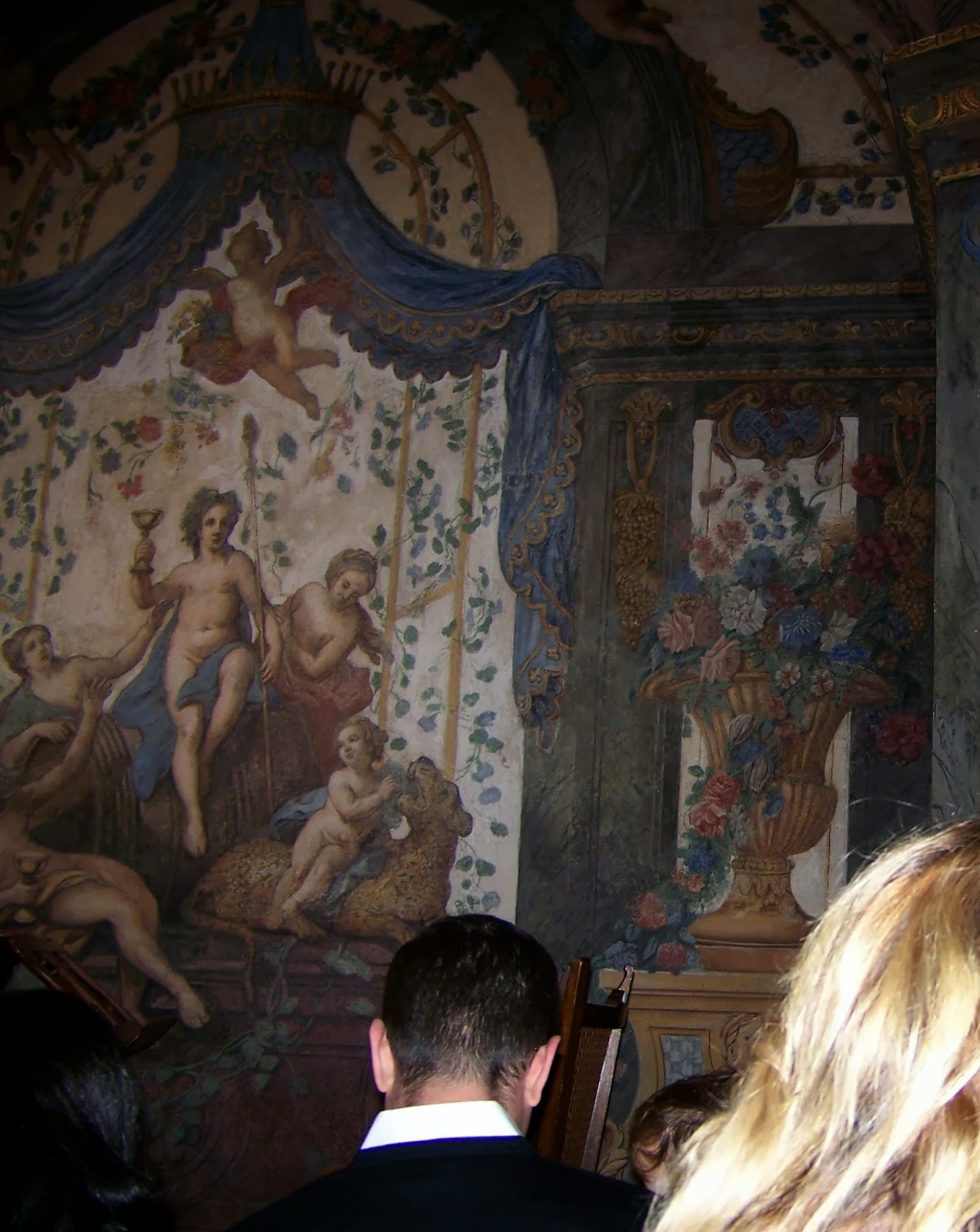Yes, Vienna
unveils itself to the traveler.
Sometimes the revelations are subtle—hardly revelations at all—and other
times they slap you in the face and make you wonder what you were thinking
before they slapped you. In my own
experience, though, insight comes in a kind of cloudy middle ground: there are
things to see, but you have to be expecting them to see them with any clarity.
Two small buildings, then, in Vienna.
The Sala Terrena and the Freud Museum.
Two different kinds of pilgrimage brought us to two different places,
and the results are some thoughts on "mythical realism" as well as
the places themselves.
The Sala Terrena is in central Vienna, nested off a little courtyard and
difficult to find. It was part of the
Monastery of the German Teutonic Order, a name that conjured unsettling
associations to me—like anschluss or lebensraum—but turned out to be more
innocent, an 18th century chamber in the House of the Teutonic
Knights. Mozart lived on the premises,
and performed in the Sala Terrena, when he was first brought to Vienna by his
Salzburg employer, Archbishop Colloredo.
It was a prelude to the two men's falling out, as Mozart's sizable ego (not
uncommon in artists, and apparently pretty extravagant in Mozart) ran up
against the Archbishop's paternalism and condescension (not uncommon in the way
patrons treated the artists they employed, and especially the case with Colloredo,
it seems). The falling-out that ensued
(Mozart lived there only two months) unmoored the young composer and turned him
loose in Vienna's almost infinite range of musical possibilities, and the rest
is cultural history. The Sala Terrena
still hosts chamber music concerts, which is what brought us there on that
December night. Dionysus, Liebe Augustin, and pseudo-Renaissance nudes in their 18th-century versions look down on you as you listen to a good but uneven quartet (in Vienna, better-than-average musicians are excellent for other cities in the world), dressed in cheesy Enlightenment costumes, playing Mozart and (on the night we attended) a little Bach
The Freud Museum is a little further from the older city center, easy to
find and clearly marked on the Berggasse.
It has a simpler story, being the home of Freud's Vienna offices from
1891 until he left for London in 1938 under the specter of the approaching
Nazis (this time Anschluss applies). He wrote almost all of his major works while
housed on Berggasse, and conducted his private practice from these rooms.
 You would think the places had little in common, and in many ways, you
would not be wrong. The exuberant Venetian Renaissance excesses of the Sala
Terrena contrast strikingly with Freud's now-spare, almost minimalist
offices. But compare my photograph
(taken surreptitiously at the Sala, where photos were discouraged) and this old
picture of Freud's desk as it appeared in the 1930s, taken by Hungarian
photographer George Brassai.
You would think the places had little in common, and in many ways, you
would not be wrong. The exuberant Venetian Renaissance excesses of the Sala
Terrena contrast strikingly with Freud's now-spare, almost minimalist
offices. But compare my photograph
(taken surreptitiously at the Sala, where photos were discouraged) and this old
picture of Freud's desk as it appeared in the 1930s, taken by Hungarian
photographer George Brassai.
The old gods are impossible to shake.
Nietzsche held that the gods were the shapes we gave to the blind, inscrutable
forces of the Will. Jung wasn't really
that far from reaching the same conclusions: for him, the gods were the shape
we gave to large, irresistible forces in our subconscious—impulses, syndromes,
psychological complexes (yes, I know Freud is probably spinning that I would
bring in Jung to talk about his
offices, but there you go!). In both
cases, side by side with established orthodoxies—Dionysus dancing in the consecrated
premises of the Sala Terrena, totems and statues of the gods on Freud's desk in
his offices—the ancient figure underlie, critique and mock the religion du jour. The old gods persist, because they are the
keepers of story, and story is a way (perhaps the way, but maybe that's just a writer talking) we define our
theologies. In the chairs of the Sala
Terrena, listening to Mozart's "Dissonanzen Quartett", or seated in
Freud's waiting room amid the stripped-down monuments to the religion of the
subconscious, mining the dissonances of our own souls, the gods watch us as we
watch other things, and it's only now and then that we have a glimpse of how,
in the very depths of ourselves, all these worlds connect.

No comments:
Post a Comment